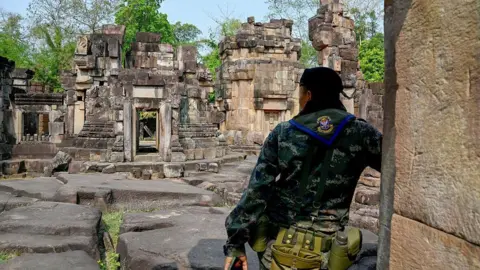In a recent escalation at the contested border between Thailand and Cambodia, troops from both nations engaged in an armed confrontation early Thursday morning. This incident adds to the rising tensions in the area, as both sides accused each other of initiating hostilities. The clash took place near the ancient Khmer temple of Ta Muen Thom, which has been a focal point of contention in recent weeks, reflecting the broader issues afflicting bilateral relations.
According to reports from the Thai military, Cambodian forces fired the first shots in this latest skirmish. They noted that tensions in the region had been escalating, particularly following an incident where a Thai soldier was injured due to a landmine explosion. The Cambodian defense ministry, however, countered these claims, asserting that its troops were acting in self-defense, having responded to what they alleged was an initial attack from Thai soldiers. They described their actions as necessary to defend their “sovereignty and territorial integrity” from perceived Thai aggression.
As the conflict unfolded, Cambodian authorities deployed heavily armed troops and utilized surveillance drones to monitor the situation closely. A spokeswoman for Cambodia’s defense ministry, Maly Socheata, emphasized the need to protect Cambodian territorial rights, accusing Thailand of seriously infringing upon them. This exchange of accusations highlights the fragile situation at the border, where military readiness on both sides has markedly increased.
The fallout from this incident has significant implications. Former Prime Minister Hun Sen’s comments on social media indicated that parts of two Cambodian provinces were subjected to artillery shelling from Thai forces. Despite these provocations, Hun Sen urged the Cambodian populace to remain calm, insisting that Cambodia has always favored peaceful resolutions to disputes. However, Prime Minister Hun Manet made it clear that there was little choice but to respond with military force under the circumstances.
Meanwhile, Thailand’s acting Prime Minister Phumtham Wechayachai characterized the ongoing dispute as delicate, emphasizing the necessity for careful diplomacy and adherence to international law. This statement underlines an understanding that any missteps could lead to further escalations in military confrontation, a reflection of the historical complexities involved in Thai-Cambodian relations.
The tensions have only been aggravated in recent months, marked by heightened military presence and reciprocal restrictions placed by both nations along the border. Diplomatic relations seem to be at a low point, reminiscent of past clashes that had resulted in casualties, including a Cambodian soldier’s death in a May conflict. Moreover, just hours before the clash, Thailand recalled its ambassador from Cambodia, solidifying the diplomatic freeze that has intensified in recent weeks.
In a broader context, the border between Thailand and Cambodia has long been characterized by a series of disputes rooted in historical grievances and territorial claims. Both countries have engaged in a cycle of military and political maneuvering, reflecting not only national security concerns but also regional geopolitical dynamics. The ongoing situation demands close observation as both governments navigate the complexities of military engagement and the imperative for diplomatic resolution.
The confrontation, while localized, symbolizes larger issues of national identity, territorial integrity, and regional stability in Southeast Asia, which have far-reaching implications for both countries and the broader international community. Moving forward, it remains crucial for both nations to engage in dialogue and seek peaceful resolutions to their disputes, which are vital not only for their own citizens but also for the stability of the region as a whole.
In conclusion, as additional reports surface regarding the ongoing situation, it is clear that the Thai-Cambodian border remains a flashpoint, with both nations on high alert and seeking to assert their sovereignty amid rising tensions.












